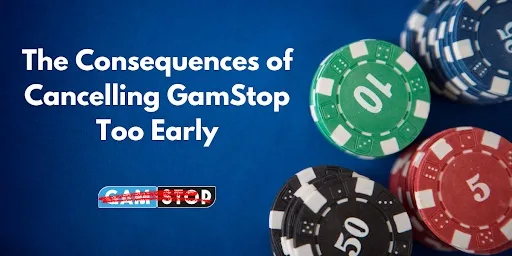In a world where 2.3% of adults are fighting a gambling addiction, GamStop becomes a matter of importance that cannot be underestimated. GamStop is a ray of light for those individuals who are trapped in the gambling addiction dilemma as it brings a kind of a cool-down period from all the gambling-related activities.
In contrast, removing self-exclusion with GamStop prematurely can lead the way back to the abyss of compulsive gambling. We aim to investigate the post-cancellation period before the end of GamStop, emphasizing the narrow path that struggling gamblers often adopt and the necessity of a strong relapse prevention scheme.
The Lure of Premature Cancellation
One of the most challenging periods that are experienced immediately after the halt of gambling activities is that of a fake sense of confidence. People can think that they are back, having the willpower again, and as a result, they may cancel their GamStop restriction before the set time has elapsed. The result here is that they are only opening themselves up to the very same environment they were trying to leave, which in turn will lead to the reappearance of the triggers and temptations that are responsible for the continued cycle of gambling addiction.
The Relapse into Problem Gambling
The click of the GamStop button can often be the start of another slide back into the grips of gambling addiction, where the cycle of compulsive betting starts again. The problem is not just the gambling relapse after a period of abstinence; it is the full-blown re-engagement with behaviour that people have struggled with for a long. The more soulful the urge to play ‘one bet more’ becomes, the less one can withstand it. Hence, the more one will gamble.
The psychological hold of addiction tends to tighten as the individuals get more involved in the vicious circle, which makes it more and more difficult to break free from it. The individual’s life becomes more and more concentrated on gambling activities, and the person’s mental health suffers even more, creating a vicious circle that is difficult to get out of.
Strain on Relationships
Gambling’s impact on relationships is enormous and complex; it both affects and is affected by various aspects of relationships. Such fall is often accompanied by dark times when gamblers try to hide their activities, thus leading to a breach in their relationship with their loved ones. Such disloyalty can result in the partners quarrelling too often, getting an impression that the other has betrayed the trust, and generally feeling far from each other. The gambler’s addiction to gambling denies him the time to spend with his family, so his loved ones feel a lack of closeness and are not appreciated.
Financial Turmoil
The reactivation of the gambling account after stopping GamStop usually ends up in a situation where the gambler is financially unstable. The marathon of gambling activities will tend to drain the financial resources, with the individual either chasing losses or trying to wriggle in the win. Without proper gambling budgeting, this process can eat through one’s savings accounts, burn the limit of one’s credit cards, and accumulate unsustainable debt. Financial struggles are not only experienced by the gambler but also affect the whole family, and if not solved, may lead to deep-rooted economic problems.
The weight of debt may become unbearable, and future consequences could be damaged credit scores, legal issues, or inability to have enough for a basic living. A chronic gambler may lose his family by losing all his money, adversely affecting family relationships. Additionally, it may cause the gambler to experience severe guilty feelings and depression.
Mental Health Deterioration
Gaming addiction not only destroys the financial status of a person but can also affect mental well-being. The life of a gambler may include winning, losing, and chasing losses, and all of these may lead to chronic stress, anxiety, and depression.
A gambler may feel guilty and ashamed after having had a gambling spree. If that is not dealt with, the negative emotions build up over time, and the person may experience feelings of worthlessness and confusion.
The Importance of a Relapse Prevention Plan
The recovering gamblers must make a relapse prevention plan for risk reduction. This plan is supposed to include coping strategies for triggers, other activities as alternatives to gambling, as well as a support system composed of friends, family and, if possible, professionals. An addict is to remain active with your support group or therapy, which can provide the accountability and the inspiration that is needed to go through a hard time.
Conclusion
Recovering from gambling addiction is a long and demanding thing. The premature end of a GamStop session or other self-exclusion solutions has a high possibility of retracing the progress made by an individual and, eventually, finding themselves back in the depths of their addiction.
This threatens financial stability and relationships and puts academic stress on the mind of the recovering gambler. A war on gambling addiction through GamStop is being fought to the uttermost.

